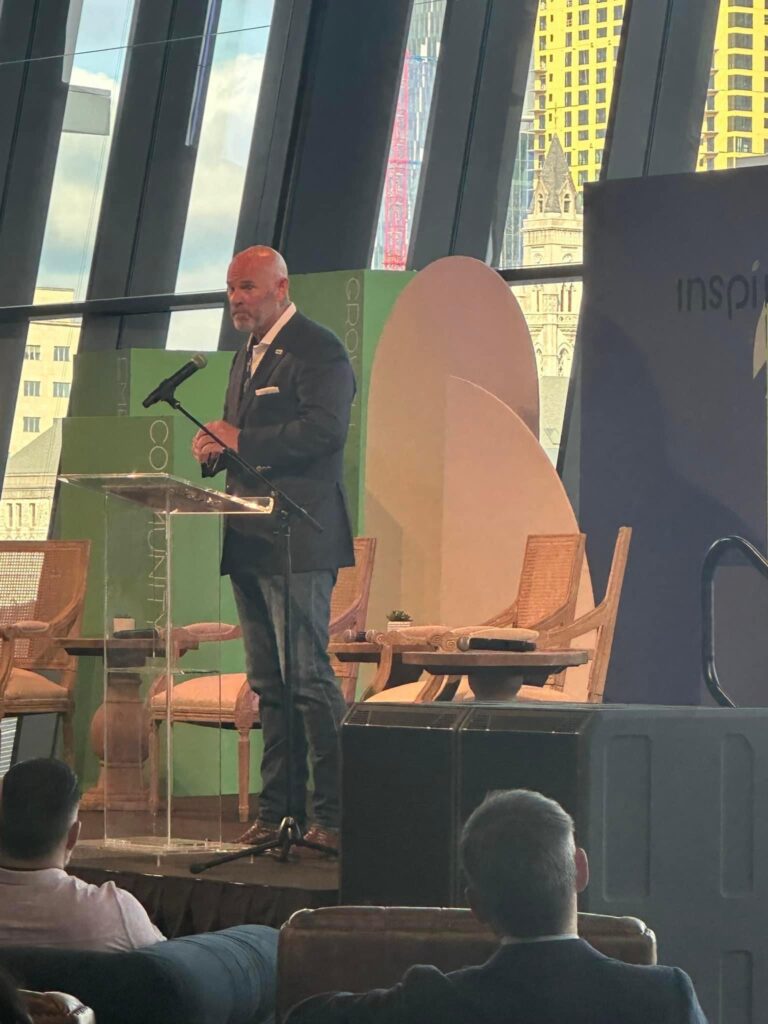The second annual Inspire Recovery conference, held recently in Nashville, brought together representatives from various organizations nationwide, from managed care to state Medicaid agencies to the provider and social support communities. This full-day conference presented by Wayspring included specific panels addressing substance use disorder (SUD) treatment access, state and health plan collaboration in Medicaid, and the role of lived experience in engaging hard-to-reach members.
Here are our key insights from the second annual Inspire Recovery Conference:
Effective Treatment and Policy Initiatives Must Be Informed by Lived Experience
We’ve heard it time and time again. Lived experience and community-based programs are essential for longitudinal programs focused on the SUD / Medicaid space.
 To highlight this, we began the conference with an impactful keynote by Kevin Lynch, CEO of the Quell Foundation, whose personal and professional journey intersects poignantly with the urgent issues of mental health and substance use disorders (SUD). Lynch’s keynote delved into the foundational aims of the Quell Foundation, which strives to reduce suicide, overdoses, and the incarceration of people living with mental illnesses by promoting openness, education, and improved access to treatment.
To highlight this, we began the conference with an impactful keynote by Kevin Lynch, CEO of the Quell Foundation, whose personal and professional journey intersects poignantly with the urgent issues of mental health and substance use disorders (SUD). Lynch’s keynote delved into the foundational aims of the Quell Foundation, which strives to reduce suicide, overdoses, and the incarceration of people living with mental illnesses by promoting openness, education, and improved access to treatment.
Lynch’s address was particularly resonant as he shared heartfelt narratives from his own life, emphasizing the profound need for a societal shift in how mental health and substance use are perceived and treated. He spoke about the stigmatization that often shadows these conditions and highlighted the essential role of personal stories in dismantling these stigmas.
In addition, Lynch discussed the systemic obstacles faced by individuals seeking help, such as the lack of timely access to competent care, which often leads to self-medication and exacerbates the cycle of mental health crises and substance abuse. He criticized the inadequate support structures that fail to provide timely interventions, highlighting this through his personal trials of his son’s battles with mental health and legal issues.
His narrative underscored the critical gaps in our health care and judicial systems, which often leave those with SUD and mental health issues underserved. He urged the audience to advocate for and implement evidence-based, compassionate care strategies that genuinely address the needs of individuals affected by these profound challenges.

Immediately following his keynote was a panel comprised of individuals with lived experience. The stories shared by these individuals in recovery showcased the everyday challenges faced by those battling SUDs. These narratives brought a human element to the discussions, highlighting the importance of empathy, understanding, and personalized care approaches in treatment programs. Such testimonials are vital for policymakers and service providers as they design interventions that address the real-world complexities of addiction and recovery.
Health Plans Are Breaking Down Barriers with Innovative Models
Health plans are breaking down old barriers and are bringing new models to market.
Throughout the conference, there was a strong focus on evolving health plan models to support more integrated and coordinated care. Innovative health plans are increasingly adopting value-based models that prioritize patient outcomes over service volume, a shift that promises to transform the landscape of SUD treatment. These models facilitate closer collaboration between behavioral health specialists, primary care providers, and social services, ensuring patients receive comprehensive, continuous care.
Discussions detailed how such integrative approaches improve patient outcomes, enhance system efficiencies, and reduce overall healthcare costs. By breaking down the silos between different care providers, these models allow for a more holistic approach to treating SUDs, addressing not just the medical aspects of addiction but also the underlying social and psychological factors. This systemic integration is crucial for creating sustainable recovery pathways and supporting individuals throughout their recovery journey.

MCOs Play a Crucial Role in Enhancing SUD Treatment Outcomes
The conference featured a dynamic discussion about MCO collaboration and value creation in substance use disorder treatment, moderated by Beth Mason of Wayspring. Key stakeholders from the leading managed care organizations in Kentucky shared their insights on the critical role of MCOs in driving both clinical and financial outcomes. The dialogue centered on how MCOs can leverage partnerships to enhance service delivery and address broader social determinants of health, which are crucial for long-term recovery and wellness.
The session also highlighted successful partnerships and collaborative efforts between MCOs and various health providers to innovate treatment approaches and expand care access. Discussions underscored the importance of creating flexible and responsive healthcare ecosystems that adapt to the evolving needs of the SUD population.
Strategic Adaptations to Regulatory Changes Ensure Continuous SUD Care
The conference also tackled the significant regulatory changes affecting Medicaid and broader SUD treatment frameworks. With the expiration of certain emergency measures and shifts in DEA regulations, service providers face new challenges that require flexible, informed responses. The discussions provided a detailed look into how organizations can adapt to these changes without disrupting care. Specific strategies discussed included leveraging new federal and state policies to expand services, optimizing funding streams, and improving the quality of care.
Also discussed was how organizations are navigating these regulatory landscapes by adopting innovative practices that comply with new rules while maintaining high standards of care. This proactive approach ensures that service delivery remains uninterrupted and continues to meet the needs of individuals struggling with substance use disorders. Moreover, these strategic adaptations are critical in shaping future regulatory policies by providing data-driven insights and evidence-based recommendations.

Integrating SUD Treatment with the Justice System Reduces Recidivism and Enhances Recovery Outcomes

A vital addition to this year’s conference was the focus on the intersection of the justice system and substance use disorder treatments. Discussions centered around creating effective treatment frameworks within the correctional system and ensuring continuity of care post-release. The session outlined how partnerships between correctional facilities and healthcare providers can facilitate access to treatment for incarcerated individuals and support their reentry into society.
Panelists discussed the importance of timely access to treatment for the justice-involved population, noting the critical role of virtual health platforms introduced during the pandemic. They highlighted successful models of in-prison treatment programs and post-release care coordination, which have shown promising results in reducing recidivism and fatal overdoses. The session also covered the challenges and strategies for integrating healthcare interventions within the justice system, emphasizing the need for collaborative efforts between correctional administrators, healthcare providers, and community organizations.
Conclusion
The Inspire Recovery conference set the stage for a year of action and advancement in SUD treatment. Participants left equipped with new knowledge, strategies, and connections that we hope will enhance the support systems for individuals battling substance use disorders.
We encourage everyone, particularly those who could not attend, to reach out to learn more about how Wayspring addresses these key insights. Let’s keep the conversation going and continue to work together towards a future where comprehensive, compassionate treatment is accessible to all. Talk with us today.